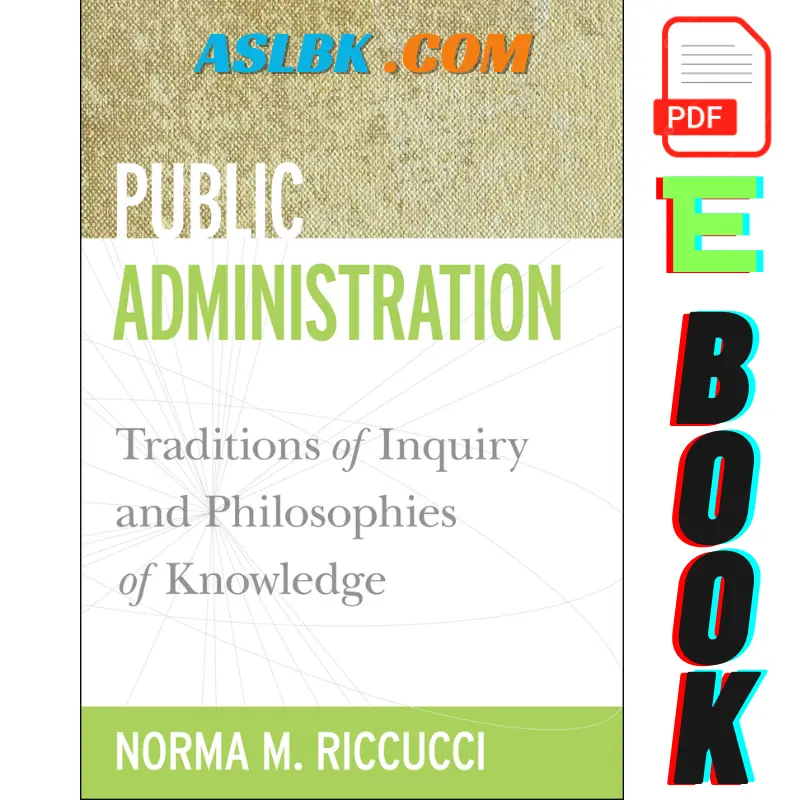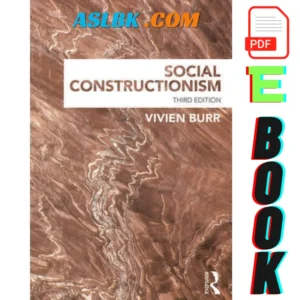by Norma M. Riccucci
Explore the Diverse Approaches to Knowledge in Public Administration
Available now on aslbk.com, “Public Administration: Traditions of Inquiry and Philosophies of Knowledge” by Norma M. Riccucci is a thought-provoking exploration of the various epistemic traditions that shape the field of public administration. This ebook delves into the core philosophical debates about how we know what we know in public administration, challenging readers to think critically about the assumptions and methods that underpin our understanding of the field.
Move Beyond the “Art vs. Science” Debate: Embrace Heterogeneity in Inquiry
This book transcends the traditional “art vs. science” debate that has often dominated discussions about the nature of public administration. Instead, Riccucci argues for a more nuanced and pluralistic approach, recognizing the value of diverse research traditions, including interpretivism, rationalism, empiricism, postpositivism, and postmodernism.
Delve into the Historical Roots and Evolving Paradigms
“Public Administration: Traditions of Inquiry and Philosophies of Knowledge” traces the intellectual development of the field, from its early roots in practice to the influence of the behavioral revolution and the emergence of new public management. Riccucci examines the ongoing search for a paradigm in public administration, exploring the strengths and limitations of various epistemic traditions and their contribution to theory building.
Gain a Deeper Understanding of Key Concepts
Ontology: Explore the nature of reality and existence in public administration. What constitutes “truth” in a field characterized by political, social, and cultural influences?
Epistemology: Uncover the different ways of knowing and the relationship between the researcher and the research process. How do our own biases and perspectives shape our understanding of public administration phenomena?
Methodology: Examine the diverse research methods employed in public administration, including qualitative, quantitative, and mixed methods. Understand the strengths and limitations of each approach and how they can be used to generate knowledge and contribute to theory building.
Paradigms: Explore the concept of paradigms in the context of public administration. Does the field have a unifying paradigm, or is it characterized by multiple, competing perspectives?
Postnormal Science: Discover the concept of postnormal science and its relevance to public administration. How does this framework account for the complex, uncertain, and value-laden nature of the field?
Key Features:
Comprehensive Overview: Provides a comprehensive overview of the major philosophical debates and research traditions in public administration.
Critical Analysis: Offers a critical analysis of the strengths and limitations of different epistemic approaches.
Engaging Examples: Includes numerous examples of research from across the field, illustrating the application of various methodologies.
Thought-Provoking Discussion: Encourages readers to engage in thoughtful reflection about the nature of knowledge in public administration and the implications for future research and practice.
Who Should Read This Book?
Students of public administration, public policy, political science, and related fields: Gain a deeper understanding of the philosophical underpinnings of your field and develop a critical perspective on research methods.
Researchers and academics: Explore the diverse epistemic traditions in public administration and enhance your ability to design and conduct impactful research.
Public administrators and practitioners: Develop a more nuanced understanding of the complexity of knowledge in public administration and the implications for decision-making and practice.
A Detailed Exploration of the Chapters
Chapter 1: Intellectual Heritage and Theoretical Developments: Is Public Administration an Art or a Science?
This chapter sets the stage for the book by examining the historical evolution of public administration, focusing on the enduring debate about whether the field is an “art” or a “science.” Riccucci traces the influence of key figures like Woodrow Wilson and Frederick Taylor, who emphasized the scientific principles of efficiency and management. She then explores the influential work of Herbert Simon and his call for a scientific approach to studying administrative behavior, which sparked a lively debate with Dwight Waldo, who emphasized the importance of values and ethics in public administration. This chapter highlights the enduring tension between those who seek to make public administration a science and those who recognize its inherent complexity and value-laden nature. Foundations for Inquiry 1st Edition
Chapter 2: Searching for a Paradigm: Public Administration as a Postnormal Science
This chapter delves into the concept of paradigms in the context of public administration, drawing on Thomas Kuhn’s influential work on the structure of scientific revolutions. Riccucci explores the arguments for and against the existence of a unifying paradigm in the field. She examines various factors that contribute to the lack of a clear paradigmatic base, including the applied nature of public administration, its multidisciplinary influences, and the pervasive role of politics. Ultimately, she proposes that public administration can be better understood as a postnormal science, which acknowledges the complex, uncertain, and value-laden nature of the field and the need for diverse epistemic approaches.
Chapter 3: Identity Crises in the Social Sciences
This chapter expands the discussion beyond public administration, exploring the identity crises and paradigmatic debates that have plagued other social science disciplines, such as political science, sociology, education, and psychology. Riccucci demonstrates that public administration is not alone in its struggle to define its identity and articulate its research traditions. She highlights the common thread of tension between positivism and postpositivism, as well as the ongoing search for a balance between qualitative and quantitative research methods.
Chapter 4: Searching for Truth: The Logic of Inquiry in Public Administration
This chapter provides a comprehensive framework for understanding the logic of inquiry in public administration, focusing on the key concepts of ontology, epistemology, and methodology. Riccucci presents a typology of epistemic traditions, including interpretivism, rationalism, empiricism, postpositivism, and postmodernism, and explores the different assumptions about reality, knowledge, and research methods associated with each. She argues that each tradition offers a valuable perspective on public administration, and the choice of approach should be guided by the research question and the researcher’s own ontological and epistemological commitments.
Chapter 5: Theory Building through Qualitative Approaches
This chapter focuses on the use of qualitative research methods in public administration, highlighting their potential for generating knowledge and contributing to theory building. Riccucci provides a range of examples, showcasing the application of interpretivist, rationalist, empirical, postpositivist, and postmodernist approaches. She explores the use of methods such as hermeneutics, content analysis, ethnography, case studies, narratives, and best practices research. She emphasizes the importance of understanding the philosophical underpinnings of these approaches and their suitability for addressing specific research questions.
Chapter 6: Theory Building through Quantitative Research
This chapter examines the use of quantitative research methods in public administration, highlighting their strengths for testing hypotheses, exploring causal relationships, and generalizing findings. Riccucci provides numerous examples of research from across the field, illustrating the application of empirical and logical positivist approaches. She discusses the use of methods such as regression analysis, structural equation modeling, and descriptive statistics. She acknowledges the dominance of positivism in public administration research, but also emphasizes the need for a balanced approach that recognizes the value of other epistemic traditions.
Chapter 7: Theory Building through Mixed-Method Research
This chapter explores the use of mixed methods, or triangulation, in public administration research. Riccucci argues that mixed methods approaches offer a valuable way to bridge the gap between qualitative and quantitative traditions, drawing on the strengths of each to provide a more comprehensive understanding of complex phenomena. She provides numerous examples of research using mixed methods, highlighting the diverse ways in which these approaches can be implemented. She also addresses some of the criticisms of mixed methods research, emphasizing the importance of carefully considering the philosophical assumptions and methodological implications of combining different approaches.
Chapter 8: Heterogeneity in Epistemic Traditions
This concluding chapter synthesizes the key themes of the book, reiterating the argument for a pluralistic approach to knowledge in public administration. Riccucci emphasizes the value of embracing the heterogeneity of epistemic traditions, recognizing that each offers a unique perspective on the field and contributes to the ongoing process of theory building and testing. She argues that the choice of research approach should be guided by the research question and the researcher’s own ontological and epistemological commitments. Ultimately, she encourages students and scholars of public administration to engage in thoughtful reflection about the nature of knowledge in their field and to embrace the diversity of approaches that can advance our understanding of public administration theory and practice.
Embrace the Rich Tapestry of Public Administration Research
“Public Administration: Traditions of Inquiry and Philosophies of Knowledge” is a compelling and insightful resource for anyone seeking to deepen their understanding of the philosophical foundations of public administration research. This ebook will challenge your assumptions, broaden your perspectives, and empower you to navigate the diverse landscape of epistemic traditions to make meaningful contributions to the field.

